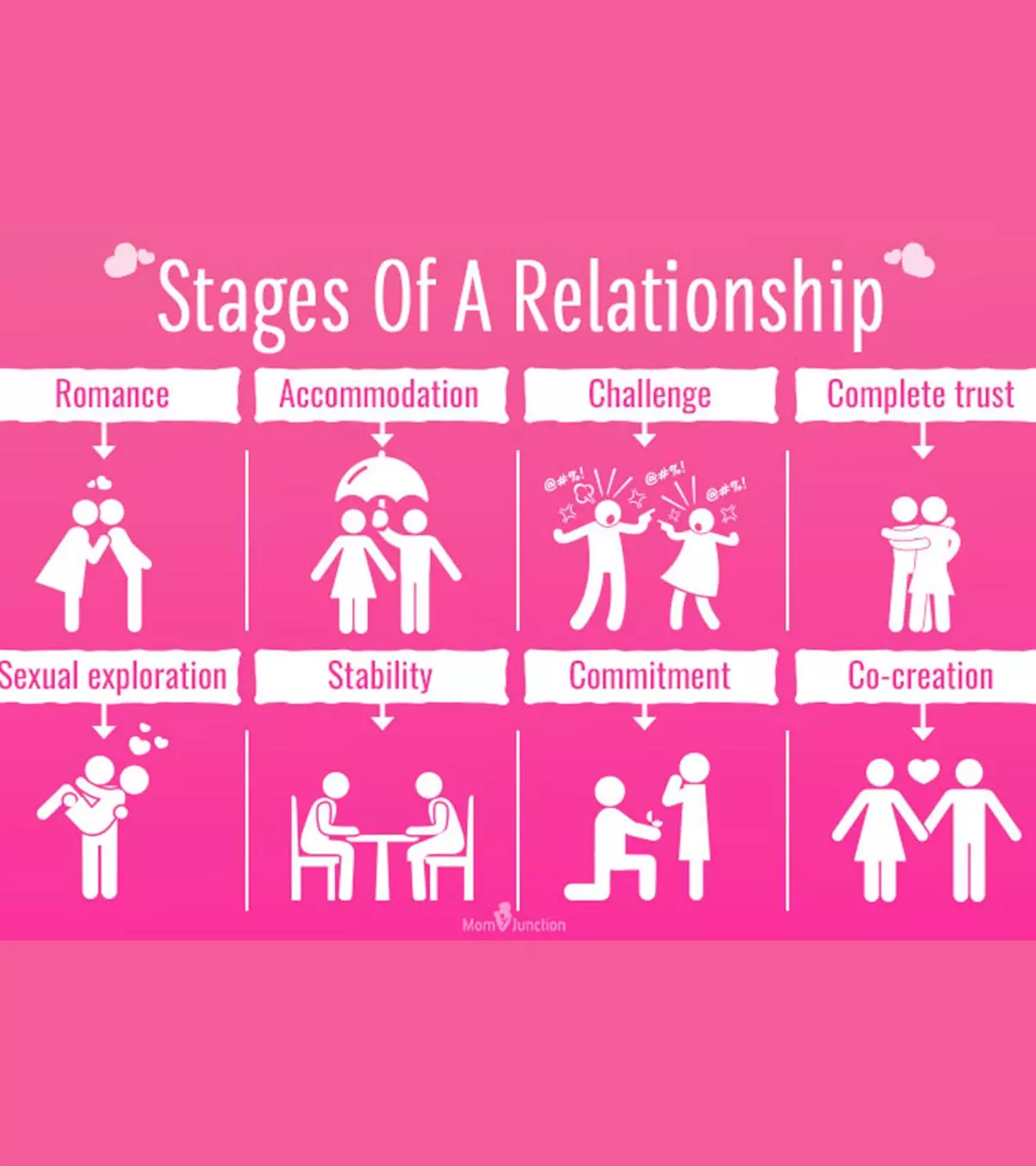
Image: ShutterStock
You may sometimes wonder about the vital stages of a relationship. Infatuation, love, romance, and marriage! This is how love develops. When we are in love, we are so engrossed in the sensation that we often forget about the stage of our relationship.
Whether you have recently fallen in love or have been married for 20 years, the intensity of love differs. When you conquer one, the other is waiting for you to cross. That is how the stages of a relationship are built, and understanding these stages can help you navigate the complexities of love while strengthening your bond with your partner.

Interested in learning more about the stages of a relationship and how to get through them? Read on!
Key Pointers
- A relationship consists of eight different stages that are: infatuation, accommodation, challenge, trust, sexual, stability, commitment, and co-creation.
- The infatuation stage is where you are smitten with each other, followed by the accommodation stage, where you get to know each other.
- In the challenge stage, power struggles dominate the relationship, and if they overcome it, they enter the complete trust stage, where they trust each other.
- The sexual stage comes next, where passion and intimacy are intense, followed by the stability stage, where both partners accept each other.
- Finally, in the commitment stage, partners surrender to the relationship, and in the co-creation stage, they work and build on the relationship together.
The Nine Stages Of A Relationship
Relationships are not always planned, they just happen. The various stages that a relationship comprises of have been mentioned below (1) (2):
1. Awkward stage
Love at first sight is not for everyone, and most couples have to endure an awkward phase at the very beginning of their relationship. This is the stage where you meet someone you like but are not sure of what they think about you.
You go on your first date and may even decide to meet again for the next date. But during this time, you are on tenterhooks because you don’t know what to expect.
You are trying to put your best foot forward but also afraid you may do something wrong. You want things to work but are also worried about making a wrong decision. The apprehension and suspense is what makes it so awkward.
Tips to survive this phase:
- Try not to overthink and instead focus on enjoying the experience.
- Be authentic, and do not put on a facade to impress the other person, as it won’t last in the long run anyway.
- Do some online research on ways to connect with a person to ensure you are in a better position to communicate with them.
2. Infatuation and romance stage
The relationship starts off with romantic attraction or an intense infatuation for each other and a feeling of ‘I cannot live without you’.
You are so attracted to each other that you focus only on the positive aspects and tend to overlook each other’s flaws.
You are occupied with your lover’s thoughts, and the only thing you want is to meet them and be with them. Hence, this phase is also called the ‘addiction’ phase. The feeling of being in love is similar to being on a ‘high’.
You can’t get enough of sex, and get physical the moment you get a chance.
You start future planning and fantasize about a beautiful life together sharing similar dreams and visions and denying all feelings of differences by being dependent on each other.
Tips to survive this phase:
- Romance is glorified in movies and books, but it’s not all that rosy in real life. The fact is that romance doesn’t last forever; you have to know the dos and don’ts of a new relationship and keep it alive by putting in conscious efforts.
- If you are serious about your relationship, then do not ignore the traits that you dislike in your lover. This is the right stage for you to decide if you can continue to love your partner with those shortcomings.
Turning a blind eye towards them will make it difficult for you to survive the next stage.
3. Accommodation stage
You spend hours together talking and understanding each other. You get to know each other’s exes, likes, dislikes, and interests. You begin to see the ‘real side’ of your partner.
You start creating an opinion about your partner and have expectations. You are elated when the expectations are met. But when they are repeatedly not met, you are disappointed.
Gradually, the differences start creeping in and once the high diminishes, you wake up next to an incompatible person, leaving a hangover of ‘how on earth did I love this person’.
Tips to survive this phase:
- Spend time understanding your and your partner’s needs.
- Trying to change your partner is a futile exercise. Instead, focus your energy on changing yourself, striving for growth, and becoming a better partner so that your partner is motivated to change themselves.
- However, if you think that the differences are too profound to be adjusted with, then reconsider your relationship goals.
Having clarity during the accommodation stage is crucial to meet the challenges in the next stage.
 Quick tip
Quick tip4. Challenge stage
This is the phase when anger, frustration, and disappointment sets in. It’s only when life throws challenges at you that you get to test the strength of your relationship through the ups and downs.
During this stage, you try to understand your partner’s needs though you might find it difficult to meet them because you feel your needs are not being met.
You become uncomfortable and annoyed with your partner’s habits, needs, and wants. So both the partners try to change each other’s behavior.
There is a struggle for power and when both partners are dominating, the relationship either suffers or ends. You might develop a vulnerability to attractions outside your relationship and might be tempted to cheat on your partner.
In this stage, couples have the risk of doing one of these two undesirable things:
i. They try to find a quick exit and break up. Such people are not committed; they keep looking for love but end up disappointed.
ii. They continue the relationship with pain and frustration and get stagnant instead of growing in their relationship. Such relationships fall flat over a period.
Tips to survive this phase:
- Think about ways to handle conflicts without disturbing the love between you two.
- Keeping quiet about your unhappiness won’t solve the problem; therefore, talk to your partner and express your feelings.
- Do not resort to a blame game or yell at them, but make sure they understand your point.
- Set some relationship rules, and ensure you don’t break these rules.
How the couples sail through this stage paves the way to the next phase.
5. Complete trust stage

Image: IStock
This is the stage where you are happy with each other and trust each other completely. You acquire the ability to predict your partner’s behavior and actions. However, this is also the time when you tend to take each other for granted.
Tips to work on this phase:
This is a comfort zone.
- Don’t take your relationship for granted.
- Invest time and effort in your relationship and continue to love and appreciate your partner.
 Point to consider
Point to considerWhen everything is going smooth between you both, you will become more vocal about your sexual desires, and that leads to the next stage.
When everything is going smoothly between you both, you will become more vocal about your sexual desires, and that leads to the next stage.
6. Sexual exploration stage
Your sex life peaks at this stage. You might want to try ways to make it interesting as the passion that you had in the initial stage might come down by now.
However, there is a risk of your libido falling. If there are differences in your sexual life and intimacy, either of you might start having an affair.
Tips to work on this phase:
- Never ignore the role of sex as an essential ingredient of a successful relationship.
- The more sexually active you are, the more romantic the relationship becomes. Hence, understand your partner’s sexual needs, express your needs to your partner, and make it work for both of you.
A good sex life, along with understanding, loyalty, and communication, stabilizes your bond with your partner.
7. Stability stage

Image: Shutterstock
The very fact that you have reached this stage means that both of you have met each other’s expectations. You have already faced several challenges and dealt with them.
This is a matured and evolved stage where you accept each other’s differences and focus on peace and compromise rather than trying to change each other. You learn from your mistakes instead of wasting your energies in fixing things.
Your love for each other deepens and matures. You accept the fact that your partner is different from you and respect each other’s boundaries. Love and connection are intense as your partnership hits this milestone.
Tips to work on this phase:
This is a comfort zone so don’t get so attached to stability that your relationship suffers.
- For your relationship to evolve there has to be a change; so step out of your comfort zone and explore your relationship from various angles to attain new heights.
- Work together on your interests, support each other in your careers, and plan your future.
Such minor improvements will make you and your partner commit to a long-term relationship.
8. Commitment stage
In this stage, you accept and surrender to the reality of your relationship with all its strengths and shortcomings. You love and trust each other, accepting all the good and bad things.
You don’t worry about losing your partner as there is trust, safety, and love. You remain committed to your relationship and indulge yourselves in shared experiences. However, it doesn’t mean you can simply ignore each others’ expectations.
Tips to work on this phase:
- Your partner might love you with all your shortcomings but it doesn’t mean they do not want you to change.
- Make an effort to bring in changes in your life to please your partner.
- Surprise them with something that they wouldn’t have expected of you.
Such things will spice up your relationship and cement it forever.
9. Co-creation stage

Image: Shutterstock
In this stage, you choose to move ahead in your relationship as a team. You appreciate and love each other in more ways than one. You work together on projects and contribute to society.
The trap in this stage is that you might spend too much time contributing to the world and forget to give time to your relationship.
Tips to work on this phase:
- Relationships are like plants; if you don’t nurture them they die. So take time to nurture your bond.
- Make sure to go on a date regularly, buy some gifts for each other, and be generous with your compliments for each other.
Frequently Asked Questions
1. What is the three-month rule in a relationship?
The most popular version of the three-month rule says you should wait three months after entering a relationship to decide if you are in it for the long haul or want to end it. Another interpretation is about breakups, where you must wait at least three months after a breakup to start dating again.
2. What is the one thing that kills a relationship?
More often than not, there is no one reason for the end of a relationship. It can be a combination of reasons like cheating, taking the other for granted, lack of communication or miscommunication, lack of honesty, etc.
3. How long does it take to define a relationship?
Some experts say it should take at most two to three months to define your relationship. However, every relationship is different, and there may not be a set rule. Instead, it should be about how you feel about the person and where you want the relationship to go.
These are some of the vital stages of a relationship. Remember, relationships need to be nurtured with love and patience. Also, you must invest your time and effort to make them stable and lovable. Moreover, your bond with your partner grows stronger as you pass from one stage of the relationship to another. Nevertheless, each relationship is unique and has its time frame to pass from these stages, and also, these stages might overlap or run simultaneously. Therefore, do not be worried if you cannot relate to a few of these stages. The most important thing in a relationship is for you and your partner to be in love and feel secure in your relationship.
Infographic: The Eight Stages Of A Relationship
A relationship goes through different emotions. If you have been in a long-term relationship, you may realize how the intense feelings and the adrenaline rush may sometimes fade while the emotional bond and love deepen over time. So, travel through the exciting feelings and stages of a relationship in this infographic.
Some thing wrong with infographic shortcode. please verify shortcode syntax
Illustration: Vital Stages Of A Relationship: Tips To Swim Through Them

Image: Stable Diffusion/MomJunction Design Team
A relationship is not a straight road but a flight of stairs that can lead you higher or lower. And there are eight vital stages in a relationship. Learn how to navigate them and make your relationship stronger.
References
- Developing and maintaining romantic relationships.
http://kell.indstate.edu/public-comm-intro/chapter/6-5-developing-and-maintaining-romantic-relationships/ - Stages of Development in Intimate Relationships
https://pauldavidphd.com/wp-content/uploads/Stages-of-Intimacy.pdf
Community Experiences
Join the conversation and become a part of our nurturing community! Share your stories, experiences, and insights to connect with fellow parents.
Read full bio of Dr. Carlos Juan Carmona-Goyena
Read full bio of Kalpana M
Read full bio of Shikha Thakur
Read full bio of Benidamika J Latam
















